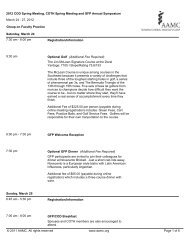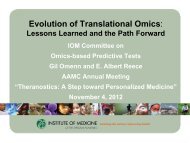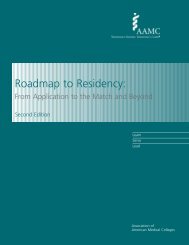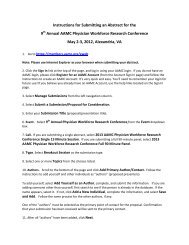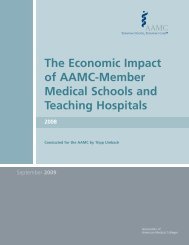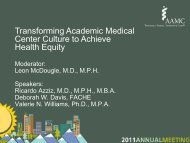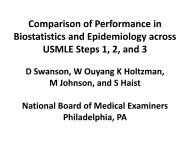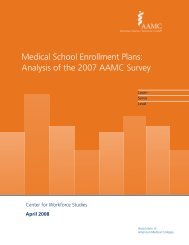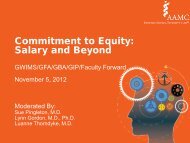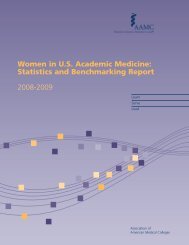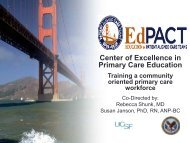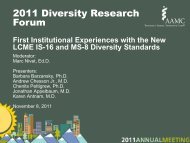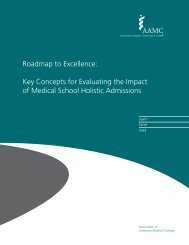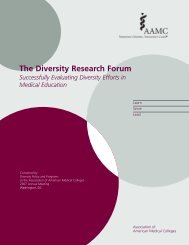Medical Students with Disabilities: A Generation of Practice
Medical Students with Disabilities: A Generation of Practice
Medical Students with Disabilities: A Generation of Practice
You also want an ePaper? Increase the reach of your titles
YUMPU automatically turns print PDFs into web optimized ePapers that Google loves.
<strong>Medical</strong> <strong>Students</strong> <strong>with</strong> <strong>Disabilities</strong>:<br />
A <strong>Generation</strong> <strong>of</strong> <strong>Practice</strong><br />
C. Admission Tests<br />
Section 504 Regulations and Title III <strong>of</strong> the<br />
ADA prohibit a college or University from<br />
using “any test or criterion for admission<br />
that has a disproportionate, adverse effect”<br />
on applicants <strong>with</strong> disabilities, unless the<br />
test or criterion has been validated as a<br />
predictor <strong>of</strong> success in the program and<br />
alternative tests or criteria that have a less<br />
disproportionate adverse effect are not<br />
available. 161 In addition, admission tests<br />
must be selected and administered so as to<br />
ensure that when a test is administered to<br />
an applicant <strong>with</strong> impaired sensory,<br />
manual, or speaking skills, the test does<br />
not reflect those impaired skills, but<br />
actually measures the applicant’s aptitude<br />
or achievement level. 162 In many situations,<br />
this will require that reasonable accommodations<br />
be provided for test-takers<br />
<strong>with</strong> disabilities. 163<br />
Special problems arise when outside<br />
entities that administer admission tests<br />
(such as the <strong>Medical</strong> College Admission<br />
Test, “MCAT”) indicate that tests taken<br />
<strong>with</strong> accommodations were taken under<br />
non-standard conditions. When the test<br />
is “flagged,” the school receiving the test<br />
results is put on notice that the applicant<br />
likely has a disability, which may then<br />
result in discriminatory treatment. The<br />
OCR has ruled that a school’s practice <strong>of</strong><br />
evaluating an applicant’s medical school<br />
admission test score in a different manner<br />
because the test was taken under nonstandard<br />
conditions violates Section 504. 164<br />
<strong>Practice</strong> Tip: A school may consider a test<br />
score indicating the test was taken under<br />
non-standard conditions as long as the test<br />
score is not the only factor used for<br />
admission and the applicant is not denied<br />
admission because he or she took the test<br />
under non-standard conditions. The mere<br />
fact that a school has notice that an<br />
applicant’s test score was achieved under<br />
non-standard conditions does not violate<br />
Section 504. 165 However, Section 504 would<br />
be violated if an institution were to ask the<br />
student why he or she took the test under<br />
non-standard conditions, or what<br />
accommodations were provided. It is<br />
equally discriminatory to evaluate scores<br />
from tests taken under non-standard<br />
conditions more favorably than scores from<br />
tests taken under standard conditions. The<br />
Association <strong>of</strong> American <strong>Medical</strong> Colleges<br />
recommends that less weight be given to<br />
MCAT scores earned under non-standard<br />
conditions and more weight be given to<br />
other application data.<br />
D. Readmission<br />
The statutory and regulatory prohibition<br />
against discrimination in admission also<br />
applies to students seeking readmission<br />
after they have been dismissed for<br />
academic or behavioral difficulties.<br />
When considering a student’s application<br />
for readmission, the school must take<br />
into consideration measures the student<br />
has taken to address his or her disability.<br />
If a student is denied readmission based<br />
on the student’s academic record and<br />
there is no indication that the student<br />
was denied readmission due to his or her<br />
disability, the school may lawfully deny<br />
the student readmission. This was the<br />
case in Rosenthal v. Webster University, 166<br />
in which the court found the student’s<br />
suspension from the University was not<br />
based on the student’s disability, but upon<br />
his disorderly and threatening actions, and<br />
that the student was denied readmission<br />
because <strong>of</strong> further inappropriate conduct<br />
which disqualified him from readmission. 167<br />
<strong>Practice</strong> Tip: A student’s disability is<br />
irrelevant in determining whether a student<br />
should be readmitted to a program. An<br />
institution may deny readmission to a former<br />
student <strong>with</strong> a disability if the student was<br />
dismissed based on the student’s performance,<br />
behavior, or academic record. However,<br />
the institution should be careful to not<br />
base its decision not to readmit a former<br />
student <strong>with</strong> a disability on stereotypes or<br />
nonfactual information.<br />
161<br />
34 C.F.R. 104.42(b)(2)(2004).<br />
162<br />
34 C.F.R. 104.42 (b)(3)(2004); 42 U.S.C. §12189.<br />
Title II regulations do not address this issue, but<br />
the same principles apply.<br />
163<br />
See infra notes 167 - 184 and accompanying text<br />
(discussing reasonable accommodations in the<br />
admissions process).<br />
164<br />
Suny Health Science Center at Brooklyn-College<br />
<strong>of</strong> Medicine, 5 Nat’l Disab. L. Rep. (LPR<br />
Publications) 77 (Aug. 18 1993).<br />
165<br />
Id.<br />
166<br />
230 F. 3d 1363 (8th Cir. 2000).<br />
167<br />
See also Texas Chiropractic College, 2 Nat'l Disab.<br />
L. Rep. (LRP Publications) 252 (Oct. 18, 1991)<br />
(concluding a student <strong>with</strong> a visual impairment<br />
was not discriminated against where request for<br />
readmission was denied based upon the student’s<br />
academic record); Robinson v. Hamline Univ., 1994<br />
WL 175019 (Minn. App. 1994) (holding law student<br />
<strong>with</strong> learning disability was not discriminated<br />
against where readmission was denied due to poor<br />
academic record); Cleveland State Univ. (OH), 3<br />
Nat'l Disab. L. Rep. (LRP Publications) 198 (Sept.<br />
29, 1992) (same); Golden Gate Univ. (CA), 2 Nat'l<br />
Disab. L. Rep. (LRP Publications) 253 (Oct. 8,<br />
1991) (same). But see DePaul Univ. 4 Nat’l Disab.<br />
L. Rep. (LRP Publications) 157 (May 18, 1993)<br />
(OCR ruling that a school must consider the<br />
actions a student has taken to address his or her<br />
disability when considering the student’s application<br />
for readmission).<br />
19 Association <strong>of</strong> American <strong>Medical</strong> Colleges, 2005



